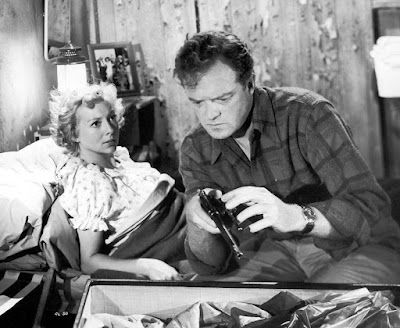Duff surviving until the end of this film seems highly unlikely. His cocky, yet naivete, gets him involved with organized crime. He is well paid for his darkroom skills, going to work for a racketeer, Brian Donlevy, who provides him with inside information about a rival's activity. Duff just "happens" to be in downtown San Francisco to capture Lawrence Tierney during the bank robbery. Duff later approaches Tierney to offer him a deal—he will keep the negative in safe keeping for a substantial fee. If that is not enough, he later hides in a parking garage to capture him in the act of installing an after-market accessory to Donlevy's limo: a bomb. The unscrupulous shutterbug now has the blackmail image of his dreams. Duff is free to swoop in for Donlevy's widow, Anne Vernon.
During the rapid climax at a high society formal event, Duff's true colors are revealed to Vernon—Tierney suggests he was responsible for her husband's death. But those negatives, hidden within a picture frame at Dow's apartment, will prove otherwise. Duff's frantic call proves fruitless. She is fed up with his fabrications and hangs up on him. Duff is a marked man. After being shot three times, he still manages to squeeze the shutter release cable hanging from his tripod to photograph Tierney firing the fatal bullet.
Duff lived for a “shot” at immortality. His photographic evidence brings the mobsters to justice. Yet the newspaper staff knew he was a "skunk of the first odor" all along.
Note: The eighty-minute film was released by Universal Pictures and directed by Joseph Pevney. It is a better-than-average B-movie noir. Fine performances all around. The powerful scores are from a stock library by several well-known composers. Duff effortlessly delivers numerous sarcastic, witty quips throughout—like a guy who memorized the excellent screenplay by Martin Goldsmith and Alfred Lewis Levitt. Ignore the poster. At no time did Donlevy attempt to punch out Duff. The viewers on the other hand....
There is at least one gullible moment in the film. Duff desperately wants that image few could capture. As a taxi fare, he notices the car in front is weaving left and right and thinks it might lead to something. The erratic car does plunge into shallow water, balanced precipitously on its side—the driver in a panic. Rather than help the driver, Duff tells him to stick his head out the side window and then stretch out his arms in a show of desperation. Why the driver would comply with these commands is difficult to fathom.












